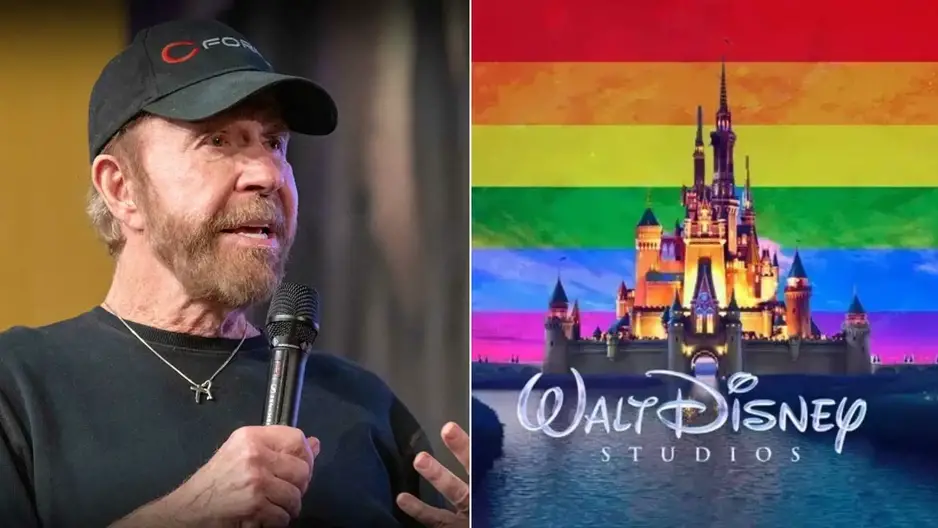
Chuck Norris, the iconic martial artist and actor known for his roles in films and television shows like *Walker, Texas Ranger*, has never been one to shy away from expressing his personal beliefs. Recently, he made headlines by turning down a substantial movie offer from Disney, reportedly worth $25 million. The reason behind his rejection? A strong stance against what he sees as the growing influence of “wokeness” in the entertainment industry.
In a statement that has since caught the attention of both fans and critics, Norris explained that his decision was not a financial one, but rather a matter of principle. He expressed concern that the focus on political correctness and social justice narratives in Hollywood was detracting from the values and stories that truly matter. Norris made it clear that he felt the industry’s shift toward prioritizing identity politics over authentic storytelling was damaging, not only to the art of filmmaking but also to its audiences.

The actor emphasized that he has always believed in creating content that resonates with a wide range of people, without being bogged down by the pressures of modern-day cultural movements. According to Norris, the entertainment industry should focus on producing stories that entertain and inspire, rather than pushing political or ideological agendas. For him, it’s about finding a balance between artistic freedom and remaining true to one’s values.
Norris’ stance comes at a time when Hollywood is grappling with increasing demands for inclusivity and diversity. There has been a growing push for representation of underrepresented groups, and many studios have made concerted efforts to incorporate more diverse characters, narratives, and perspectives into their content. However, this push has also sparked significant backlash, with some critics arguing that the industry is sacrificing quality storytelling in favor of meeting social expectations.
For Chuck Norris, the issue isn’t about opposing diversity or inclusivity. Rather, it’s about what he perceives as the forced and sometimes insincere nature of these initiatives. He has voiced concerns that Hollywood’s focus on catering to every political and social movement is overshadowing the entertainment aspect of films and television. Norris believes that filmmakers should be allowed to tell stories based on merit, not dictated by trends or societal pressures.
Norris’ rejection of the Disney offer highlights his commitment to staying true to his values, even if it means turning down lucrative opportunities. It’s a bold move, one that reflects his unwavering stance against what he sees as the detrimental effects of “wokeness” on the industry. His decision also speaks to a larger debate currently unfolding in Hollywood, where many individuals are questioning whether the push for progressive representation is benefiting or harming the art of storytelling.
Chuck Norris has always been an advocate for traditional values, often reflecting themes of patriotism, resilience, and individualism in his work. His rejection of the Disney offer is not surprising, considering his long-standing reputation for standing firm on matters of principle. Over the years, Norris has built a career not only on his acting and martial arts skills but also on his strong, independent persona, which resonates with many fans who share his conservative outlook.
While some may see his rejection of a major studio deal as a radical move, others view it as a necessary step toward reclaiming the entertainment industry from what they perceive as an overly politicized agenda. In recent years, there has been a growing backlash against the perceived influence of “woke” culture in Hollywood, with figures like Norris and others speaking out against the trend. For them, it’s a matter of preserving the freedom to create stories that are universally appealing, rather than having to adhere to a specific set of social or political values.
Chuck Norris’ decision to turn down the Disney deal may signal a larger shift in the entertainment industry. With more and more actors, directors, and producers questioning the role of politics in filmmaking, it’s possible that a new era of storytelling could emerge—one that places a greater emphasis on artistic integrity and less on ideological conformity. If Norris’ stance resonates with other industry figures, it could mark the beginning of a pushback against the pressures of political correctness in Hollywood.
In the end, Chuck Norris remains steadfast in his beliefs, refusing to compromise on the values that have defined his career. His rejection of the $25 million offer from Disney is a statement not only about his personal convictions but also about the direction in which he believes the entertainment industry should go. While many may disagree with his views, there’s no denying that his decision has sparked an important conversation about the future of Hollywood and the role of politics in creative expression.
Note: This is Satire, It’s Not TRUE.


naradaninandkevin1111@gmail.com